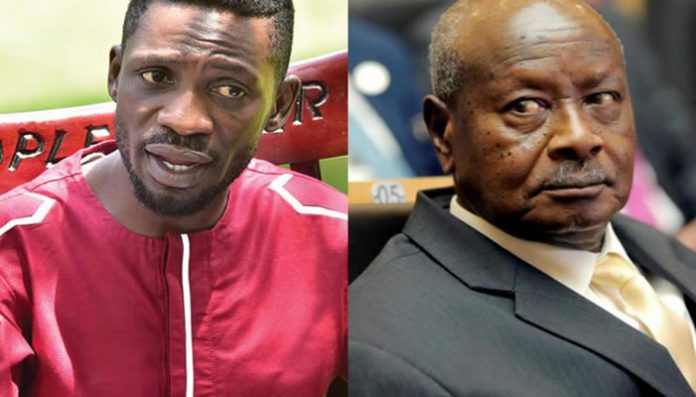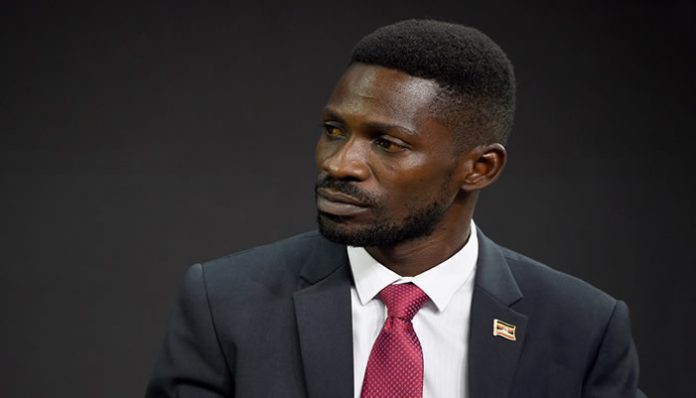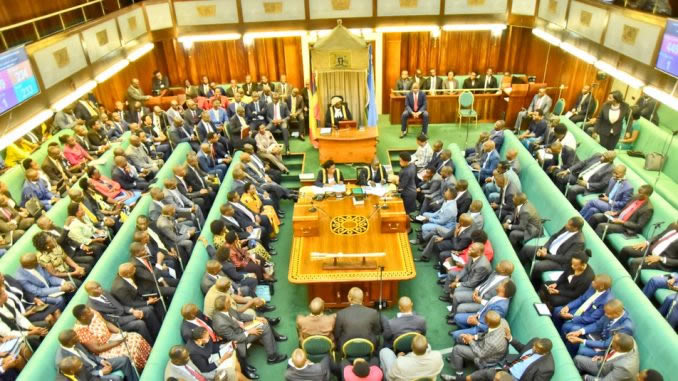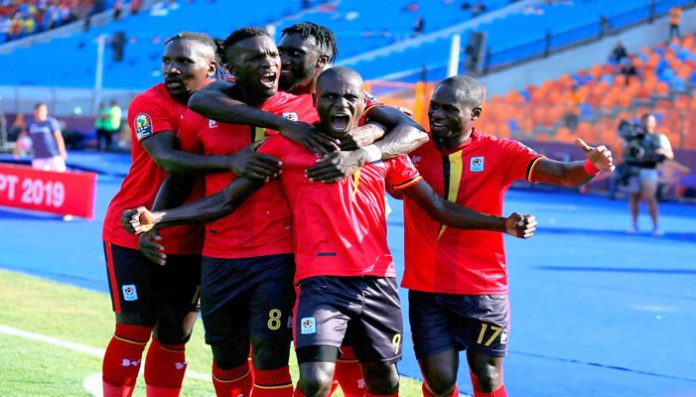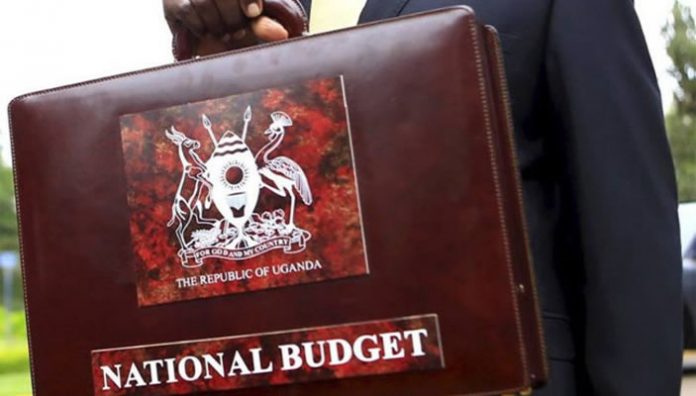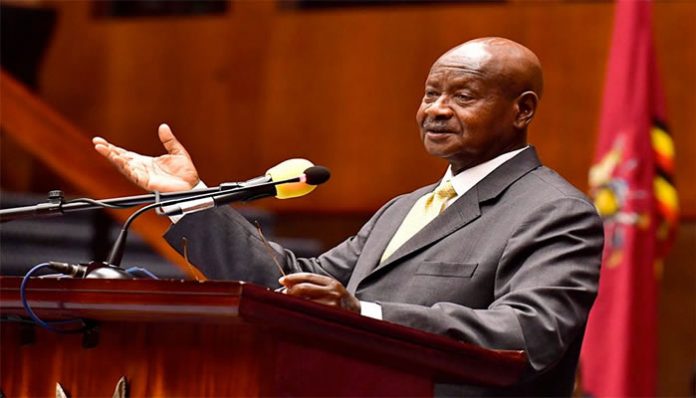Yesterday the Finance Minister Hon. Matia Kasaija read to the
public the budget for the Financial Year (FY) 2019/2020 from Kampala Serena Conference
Center.
The theme for this FY is “Industrialization for job creation
and shared prosperity”.
The budget speech (as delivered by Finance Minister, Hon. Matia Kasaija)
Salutations & Preamble
Your Excellency the President
Your Excellency the Vice President
The Right Honorable Speaker of Parliament
The Right Honorable Deputy Speaker
His Lordship the Chief Justice
His Lordship Deputy Chief Justice
The Right Honorable Prime Minister and Leader of Government
Business Right Honorable Deputy Prime Minsters
Madam Leader of the Opposition
Honorable Ministers and Members of Parliament
Members of the Diplomatic Corps
Distinguished guests, Ladies and Gentleman
In accordance with Article 155(1) of the 1995 Constitution
of the Republic of Uganda and Section 13(13) of the Public Finance Management
Act 2015, I presented the Budget proposals for Financial Year 2019/20 to
Parliament on 28th March 2019. I applaud Honorable Members of Parliament
for their dedication in the reviewing the proposals and the approval of the
budget on 24th May 2019.
My statement today therefore presents the economic and
development context under which the FY 2019/20 Budget was prepared and
highlight the priority actions that underpin the allocations that have been
appropriated by Parliament.
Introduction
Development Progress
Madam Speaker, in the Financial Year 2018/19, Budget
Statement, I reaffirm the NRM Government’s commitment to attain our cherished
goal of a middle-income status for the country through interventions, targeted
at inclusive growth and socio-economic transformation. Uganda has made
substantial progress towards this goal as demonstrated by these few examples;
- Uganda’s economy has recovered and picked
momentum, growing at over 6% per annum over the last two years
- With the progress in economic growth, average
incomes of Ugandans have increased to US$825 per person in Financial Year
2018/19, compared to US$800 in 2017/18, notwithstanding increase in population
size to 39 million Ugandans.
- The quality of Uganda’s labor force has
dramatically improved, with the proportion of labor force with tertiary
education increasing from 7.5% in 2013 to 13.6% in 2017. In addition, the
annual growth in formal employment has averaged 9.8% between 2010 and 2017,
higher than the average growth of the economy in the same period.
- The structure of the economy has changed. The share
of the industry in the economy is now 21% compared to 11.3% in 1986. Services have
increased to 48,7% from 32% over the same period. In contrast, the share of
agriculture has reduced from over 50% in 1986 to 22% in Financial Year 2018/19.
- Export performance has been excellent, with
diversification leading to non-tradition cash crops earning Uganda US$2.84
billion last financial year, compared to the traditional cash crops which
earned US$0.79 billion.
- Trade with our East African Community partners
has significantly improved generating a surplus of US$557 million last year. The
composition of exports has also changed positively with exports of light manufacturing
products exceeding traditional merchandise.
- National grid electricity connections have increased
to 1.3 million customers, and the rural electrification access rate rising from
1% in 2001 to over 13% in 2019.
- Many new factories have been opened in the course
of Financial Year 2018/19 with the result that the proportion of Ugandan products
in supermarkets has increased from 15% to 45%. Our target is to reach 50% by
the year 2020.
Madam Speaker, the few examples I have mentioned are a
direct outcome of the NRM Government’s deliberate policies over the years to
promote socio-economic transformation.
Development Challenges
Madam Speaker, despite these positive milestones, we
however, are still faced with some major development challenges. Let me single
out three; (i) Unemployment, (ii) Income Inequality, (iii) Malnutrition and
Unhealthy Lifestyles.
Unemployment
There are now approximately 600,000 entrants into the job
market every year, as a result of the universalization of health and education.
This has created the need for new jobs to meet this demand. Currently, 4 out of
10 young Ugandans are out of work.
Furthermore, the quality of jobs is of concern. The 2016
Labor force survey indicates that 50% of Ugandans work in the service sector, 35.6%
in Agriculture, and 14.4% in industry. The informality of the Agriculture and Services
sectors implies that about 80% of our labor force is in the informal sector.,
and therefore not optimally employed. With most Ugandans engaged in rural
economy, it is of paramount importance to increase productivity in agriculture
and aggressively promote agro-processing which in the end will be the basis for
Uganda’s industrialization and further job creation.
Income Inequality
Secondly, income inequality has widened the gap between
rural and urban areas, as wealth has not been created faster in rural
communities in comparison to urban areas. This is despite the country’s
progress in narrowing regional inequality, for example, in Northern and Eastern
Uganda following government’s affirmative action programmes. As a consequence,
rural-urban migration has increased with high urbanization rates causing challenges
of congestion, housing shortage and population pressure on urban social
services. These challenges have compromised the potential of Uganda’s urban
areas to serve as engines of growth and structural transformation. World Bank
studies estimate traffic congestion is costing Uganda over US$800 million in
lost National Output.
Malnutrition and Unhealthy Lifestyles
Thirdly, malnutrition adversely affects the quality of life
children and mothers, despite the variety and quality of foods that Uganda can
produce. 53% of children under five years are malnourished and hence anemic,
and 29% of them are stunted or wasted. Many women of reproductive age are also
malnourished, with 32% of them being anemic.
In addition, appropriate feeding especially among the more affluent,
is also a major cause of a surge in chronic non-communicable diseases including
coronary heart disease, cancer, diabetes, high blood pressure, and obesity. These
maladies are largely attributable to unhealthy lifestyles. Consequently, Uganda
has been spending on average US$500 million on treatment of preventable
diseases. Improving the nutrition status of Ugandans accordingly requires (i)
coordinated actions (ii) mass sensitization and education, and (iii) lifestyle
awareness.
Madam Speaker, the financial year 2019/20 Budget, therefore,
focusses on interventions aimed at increasing the wealth and improving the
livelihoods of all Ugandans. The NRM government will continue to pursue a
growth strategy that aims to create jobs and ensure that growth benefits every Ugandan.
I will elaborate this strategy later in my statement.
So, the theme for the Financial Year 2019/20 Berget,
accordingly, remains ‘Industrialization for job creation and shared prosperity’.
Madam Speaker, the Budget Statement today will cover the
following;
- Economic performance in Financial Year 2018/19
- Economic growth strategy for Financial Year 2019/20 and the Medium Term
- Financial Year 2018/19 Sector Performance and Priorities for Financial Year 2019/20; and,
- Financing Strategy for Financial Year 2019/20.
ECONOMIC PERFORMANCE IN FINANCIAL YEAR 2018/19
Global and Regional Economy
Madam Speaker, on the global scene, Africa’s economic
performance continues to recover. The EAC region is the fastest growing
economic bloc in Africa, with growth projected at 6.2% in 2019, increasing from
5.9% in 2018. This performance is mainly accounted for by the growth in the
services and agricultural sectors as well as increased consumption and
investment. Rising incomes in Africa increases demand for exports within African
countries themselves.
Uganda’s trade with other African countries is increasing,
and amounted to 59% of total goods exported in 2018. During the same year, the
East African (EAC) continued to be the largest destination.
For Uganda’s exports, total goods exported to the EAC
amounted to US$1,469 million compared to imports of US$911 million, thus
registering a trade surplus of US$557 million.
The Domestic Economy
Economic Growth
Madam Speak, the
economy has sustained the remarkably recovery witnessed in Financial Year
2017/18. The economy is estimated to have grown by 6.1% in the Financial Year
2018/19. The size of the economy is now Shs. 109 trillion, equivalent to US$
29.5 billion. The significant revival in economic growth was a consequence of increased
private and public sector activity, improved weather conditions and a
relatively stable global economy.
The Agriculture sector maintained its recovery sustaining a
3.8% growth rate in financial year 2018/19. Among other contributing factors let
mention two; (i) the strengthened enforcement of fishing activity has resulted
in recovery of fish captures (ii) provision of extension services and control
of pests and diseases has also led to a bumper harvest in crops such as maize,
beans, fruits, vegetables, and sim sim. I must say though that the growth in
the agriculture sector is still sub-optimal, given the natural resources that
we have.
During financial year 2018/19, the service sector grew at
7.2%, the highest of all sectors. This good performance was largely driven by
tourism and hospitality.
The industry sector grew at 5.8% this year, continuing the rebound which started in financial year 2016/17. Manufacturing is beginning to pick up. It grew at 2.8% this year compared to 1.7% the previous year. This is partly because of the newly commissioned factories, as I will later demonstrate.
Domestic Prices
Madam Speaker, domestic prices remain stable. Average
inflation was 3.4%, well within the policy target of 5% per annum. This is
because of increased food supplies in the markets, relatively stable exchange
rate and effective co-ordination of monetary and fiscal policies. Stable prices,
we all know, allow investment planning, improve investor confidence and
preserve the value of savings.
Exchange Rate
The Uganda Shilling has also largely been stable against
major currencies. It strengthened against the US dollar by an average of 0.6%
for the period between July 2018 and April 2019. The strengthening of the
Shilling against the US dollar was a result of higher export performance,
improved disbursement of external support for government programs, continued
Foreign Direct Investment (FDI) inflows, and roust remittances from Ugandans
abroad.
Financial Sector and Private Sector Credit
Madam Speaker, the financial sector has continued to
strengthen. Non-performing loans reduced to 3.4% at the end of December 2018
compared to 5.6% in December 2017. Private sector credit grew by 6.1% between
July and December 2018 with trade and construction sectors receiving the largest
share of credit at 20.1% and 19.8% respectively. Credit to Agriculture has
registered the highest growth, though it still remains low, at only 12.9% of
total credit extended as at December 2018.
Public Finance
Madam Speaker, domestic revenue collection too, has
increased significantly. It is projected at Shs. 16, 711.66 billion in the
financial year 2018/19, of which Shs. 16, 181.66 billion is tax and Shs. 530
billion is non-tax revenue. The surplus is Shs. 352.66 billion over the target
of Shs. 16, 359 billion.
The ratio of domestic revenue to GDP is at 15.2% this financial
year, compared to 14.6% achieved last year. This is an increment of 0.6% of GDP
in one financial year.
Madam Speaker, government spending excluding domestic debt
refinancing this financial year is projected to be Shs. 24,297.85 billion, which
is equivalent to 22.1% of GDP.
ECONOMIC GROWTH STRATEGY FOR FINANCIAL YEAR 2019/20
Madam Speaker, the Economic Growth Strategy that underpins
the Financial Year 2019/20 Budget seeks to consolidate made interventions
towards the attainment of shared prosperity. Engineering Shared Prosperity
requires that the benefits of economic growth reach all Ugandans. Our must be
provided with opportunities to create wealth and earn higher incomes. This strategy
is built on the rapid industrialization of our economy linked to high
productivity and production in agriculture; while nurturing the potential of
the key growth sectors of tourism, minerals, oil and gas. The growth of these
sectors is what will provide gainful employment to the majority of Ugandans. Entrepreneurs
who strong links with the production households, are the key to unlocking the
potential of these key sectors, leading to prosperity for us all.
The Economic Growth Strategy consists of three interlinked
parts;
- Expanding the industrial base of the economy
- Expanding Natural Resource Endowments with
Environmental protection in mind, and
- Providing affordable financing for production
and business.
Expanding the industrial base of the economy
Madam Speaker, the NRM government has already successfully
laid the foundation for Uganda’s industrialization. The key bottlenecks such as
inadequate electricity and transportation infrastructure, the lack of basic
education and health, have, to a large extent, been addressed. Consequently,
the manufacturing sector is now able to meet domestic demand for basic products
like cement, tiles, light steel products and consumables such as sugar and soap.
The next phase of manufacturing in Uganda will be to produce goods for exports and
also replace Uganda’s imports.
Uganda’s industrialization in the future has accordingly
been designed based on two strategic pillars. The first strategic pillar
provides developed and serviced areas, where industrial production for several
enterprises take place. The plan involves building fully planned and serviced
industrial parks in 22 locations across the country. industrial parks will
house medium and large scale industries.
The second strategic pillar supports the development of
product value chains which link nucleus entrepreneurs to out-grower farmers. These
product value chains permit marketing of agricultural products, agro-processing
for value addition, as well as the efficient provision of finance and other
inputs of production. It will ensure that majority of Ugandans are productively
engaged. We have already successfully established a few product value chains in
agro-industry in citrus fruit, vegetable oil and dairy industries. The next
move is to expand product value chains to other commodities across the country.
Exploiting natural resources endowments with environmental protection in mind
Madam Speaker, exploiting Uganda’s natural resource endowments
provides opportunities for growth, and the provision of incomes and a descent
livelihood to the majority of Ugandans. The three natural resource endowments Uganda
has include vast arable land and fresh water resources, abundant wildlife and
diverse environment, and plentiful minerals, oil and gas deposits. Appropriately
exploiting these natural endowments requires being mindful of the adverse
impact of over-extraction, over-utilization, and wasteful use of benefits they
provide. Addressing climate change aggressively is therefore key to
appropriately exploiting our natural resource endowments.
Commercializing Agriculture
Appropriate exploitation of Uganda’s arable land and freshwater resources, requires climate-smart commercialization of agriculture. Because the majority of Ugandans are part of the rural households, achieving inclusive growth requires that we use modern farming practices, advanced agricultural inputs and technology, post-harvest storage, and improve product market access. This will positively change the livelihoods of over 68% of Uganda’s households who are currently engaged in subsistence agriculture.
Commercializing agriculture has the greatest potential for
increasing household productivity and incomes, while addressing unemployment in
the rural communities. The use of product value chains based on the National
Agricultural Zoning Strategy will also facilitate agricultural
commercialization. Successful agro-processors will be engaged to serve a
nucleus linked to farmers who sell their produce to the processor. In addition,
product value chains permit inputs such as extension services and finance to be
delivered. This approach will lead to an in increase in sustainable production
at the farmer household level, while increasing productivity and incomes. In addition,
the approach will nurture agro-based industries across the country, employing labor
that will have been released from primary agriculture.
Addressing Climate Change
Madam Speaker, deforestation and destruction of wetlands
adversely impacts the welfare of our people in the following way;
- Water shortage or no water at all, for domestic
use and production
- Increased temperatures and several long droughts
- Over-flooding and/ or increasing landslides in
highland, and
- Destructive winds due to lack of windbreakers
Re-afforestation and restoration and restoration of wetlands
must be undertaken as a matter of urgency, and the destruction of wetlands and
forest cover will be penalized through the enforcement of environmental laws
and regulations. Local governments must enact and enforce ordinances on tree
planting, efficient waste management and wetland conservation. The ban on use
of harmful materials such as environmentally destructive polythene bags, among
others, will also be unequivocally enforced. I appeal to the private sector to
adopt climate-smart technologies.
Tourism
Madam Speaker, Uganda’s natural and cultural heritage are critical
to tourism. Utilizing our natural heritage endowment by realizing its tourism
potential will provide Uganda significant benefits. Notwithstanding its current
level of development, the tourism sector has made dramatic progress and now
ranks as the highest foreign exchange earning sector. In 2018, foreign receipts
from tourism reached US$ 1.02 billion, with 1.6 million international tourist
arrivals being recorded. Uganda is now a known international touristic
destination of choice, which strongly justifies developing its tourism
potential for benefits it will provide to Ugandans in particular and the
economy in general.
Sustained growth of Uganda’s tourism, therefore, requires conservation of our natural and cultural heritage. Appropriate legislation will be enacted and vigorously enforced to preserve cultural sites and monuments and deter illicit trafficking of protected wildlife and antiquities. Tourists hubs and circuits will be developed for product development and the marketing of Uganda as touristic destinations of choice based on religious, natural and cultural heritage. Infrastructure, including road and air transport, electricity and hospitality facilities, will be developed to enable efficient access to tourist destinations, and adequate hospitality. World-class skills will be built in hospitality and tourists handling, wildlife conservation, tour and travel management, food and beverage services.
Minerals, Oil and Gas
Madam Speaker, extracting minerals, oil and gas will
contribute to building a solid resource base for the economy, while providing jobs
to many more Ugandans. The priority minerals to be exploited include; Iron Ore,
Limestone, Phosphates, Oil and Gas, Dimension Stones, Gold, and rare earth
metals.
The key strategic actions
required to commercialize this sector include minimizing speculation and
hoarding of mineral licenses; enforcement of mining regulations; the airborne
geo-physical mapping of Karamoja, and provision of key road and energy
infrastructure.
Madam Speaker, in order to avoid wasting and
leakage of the benefits from minerals, oil and gas resources, proceeds of
extraction will be invested for both the current and future generations. In
this regard, a Petroleum Revenue Investment Advisory Committee has been appointed
to guide this process in line within a clear and transparent policy. Uganda has
also joined the Extractive Industries Transparency Initiative (EITI) to
publicly account for all proceeds of minerals, oil and gas sectors.
Affordable Financing for the Private Sector
Madam Speaker, access to affordable finance is
an important catalyst for the growth of viable private sector enterprises.
Affordable long term finance from development financing, pensions, and capital
markets sources, facilitate Private Sector investment. Commercial bank lending
rates remain high. This calls for Government interventions.
In this regard, the Uganda
Development Bank (UDB) will be further capitalized. I have allocated Shs. 103.5
Billion next Financial Year for this purpose. In additions, to support private
companies raise equity capital, the Capital Markets Authority will establish a
center to facilitate access to long term domestic and foreign capital on the
stock exchange. The necessary legal and regulatory framework for the operation
of Private Equity funds will also be designed to attract more investment into
Uganda’s private sector.
Madam Speaker, financial sector reforms
including agency banking, bancassurance, Islamic banking, and enhanced access
to Credit Reference Bureau services, will reduce operational costs of
commercial banks. The use of movable assets as collateral for loans has also
been facilitated with the enactment of the Security Interest in Movable
Property Act, 2019.
In addition, the Uganda
Microfinance Regulatory Authority is now fully operational. This will enhance
consumer and investor confidence in the microfinance industry and money lending
business. The electronic chattels register will be also be operationalized to
ease access to credit. Furthermore, business clinics will be run by the Uganda
Registration Services Bureau to enhance registration of informal businesses.
Madam Speaker, Small and Medium
Enterprises require affordable credit. I have provided an additional Shs. 40
Billion to the Microfinance Support Centre for on lending at affordable
interest rates, not exceeding 12% per annum. Special programmes to enhance
access to credit for youth and women entrepreneurs will also continue to be
implemented. The skills programme for Youth and the Uganda Women’s
Entrepreneurship Programme have been allocated Shs. 130 billion and Shs 32
billion respectively.
Madam Speaker, to de-risk
lending to agriculture, the Uganda Agriculture Insurance Scheme (UAIS)
subsidizes agriculture insurance premiums paid by farmers. Agriculture
insurance protects farmers against key agricultural risks, such as those
resulting from natural disasters. This ultimately attracts affordable credit to
agriculture. By March 2019, 77,000 farmers had accessed Agriculture Insurance,
across all regions of Uganda.
Madam Speaker, in order to
develop a sound financial sector that supports sustainable and inclusive
economic growth, we recently developed the Medium Term Financial Sector
Development Strategy.
Enablers of the Growth Strategy
Madam Speaker, effective
implementation of the Economic Growth Strategy I have just talked about
requires that certain pre-conditions are in place. These pre-conditions include
Peace and Security, Good Governance and an efficient judicial system, together
with macro- economic stability. Additional enablers required for economic
growth include (i) reliable, efficient and affordable electricity supply; (ii)
water, transport and communications infrastructure, (iii) a healthy,
well-educated and skilled workforce and (iv) an effective government machinery.
The NRM Government has since 1986 striven to provide these pre-conditions,
which have, to a large extent, been met.
FINANCIAL YEAR 2018/19 SECTOR
PERFORMANCE AND FINANCIAL YEAR 2019/20 PRIORITY INTERVENTIONS
Madam Speaker, I now turn to
the specific priority interventions that will be implemented in the forthcoming
year in furtherance of the Economic Growth Strategy, while reporting respective
developments that have been recorded during the financial year now ending.
These interventions include:-
i) Enhancing Key Primary Growth
Sectors
ii) Increasing Infrastructure
Access and Reliability;
iii) Human Capital Development;
and
iv) Maintaining Peace and
Security, and Good Governance.
I. Enhancing Key Primary Growth
Sectors
(i) Industrialization
Madam Speaker, Government has
already commenced the establishment of an industrial base. The Iron and Steel
industry now has 24 steel industries and its installed capacity has doubled to
1.7 million tons per annum from 866,000 tons five years ago. The Cement
industry has expanded to five cement factories more than doubling annual
production to 4.43 million tons, from 2 million tons five years ago.
Agro-processing factories have
been commissioned in Teso and Luweero for Citrus fruits, Dairy in Ankole,
Vegetable Oil in Kalangala, and Tea in Toro and the Kigezi sub-regions. The
Uganda Development Corporation (UDC) has acquired a 32% stake in Atiak Sugar
Factory, which will serve as a nucleus facility for an out-grower scheme in
Atiak and Lamwo. UDC has also extended ten-year equipment lease financing
arrangements to tea factories in Western Uganda, namely:- the Kigezi Highland
Tea Company Limited, Kayonza Growers Tea Factory and Mabale Growers Tea Factory
Limited.
Madam Speaker, one private and
three public industrial parks are already operational at Kapeeka, Namanve,
Luzira and Bweyogerere. The Kampala (Namanve) Industrial Business Park is 40%
complete, and will be fully serviced in the medium term. The Park already
boasts of 33 operational factories with an estimated 15,000 jobs created. 87
factories are under construction and 120 are at pre-investment stage. During
the year, the following strategic factories were commissioned at Namanve
Industrial and Business Park:- Orion Transformers and Electric Ltd which
manufactures electricity transformers, switch gears, and smart meters; Alfasan
Company Ltd which manufactures veterinary and human medicines, and Steel and
Tube which produces steel products.
At the Luzira Industrial and
Business Park, 9 industrial plants are operational with 7,000 employees. The
Bweyogerere Industrial Park has 4 operational industrial plants in
agro-processing and other manufacturing with 5,000 employees. At the Soroti
Industrial Park, the Soroti Fruit Factory was commissioned during the year.
In addition to the above public
industrial parks, Lio Shen Industrial Park at Kapeeka where Government is
providing infrastructure, 5 factories out of the targeted 10 are operational
now. These include Ho and Mu Food Technology (U) Ltd which dries fruits for
exports and Goodwill Ceramics (U) Co. Ltd which manufactures tiles using more
than 90% of local inputs.
Development of the Mbale,
Soroti, Iganga, Mbarara and Jinja Industrial Parks is on-going. Other
industrial parks will also be developed by providing basic infrastructure
including roads, electricity, water and information technology and
communications infrastructure. 14 Free Zones to promote exports have also been
licensed in Arua, Jinja; Kalungu, Mpigi, Mukono, Wakiso, Tororo, Kampala, and
Buikwe.
Madam Speaker, in order to
speed up industrial growth, the budget for FY 2019/20 will undertake the
following priority actions:-
i) Fast-track feasibility
studies, including engineering designs, for all the
proposed industrial parks;
ii) Develop serviced industrial
parks and workspaces;
iii) Reform Technical and
Vocational Education and Training (TVET) to
provide the skills required in
the job market;
iv) Establish the Industrial
Skills Production Center at Kampala Industrial
Area (Namanve) to provide
skills development, innovation and knowledge transfer critical for researchers,
industrialists, innovators and youth in particular. The Center will also
address technology gaps in Uganda while boosting value addition.
v) Promote and expand the
Uganda Industrial Research Institute’s (UIRI) Industrial and Technological
Incubation Center. In addition UIRI will establish Regional and Model Value
Addition Centers
vi) Provide an additional
Shs.10 billion to the Soroti Fruit Factory for working Capital requirements to
purchase required raw materials
vii) Support applied research,
innovation and industrial development at the Presidential Initiative on Banana
Industrial Development (PIBID), the Presidential Initiative on Science and
Technology (PIST), and the Kiira Electric Vehicle Project among others. In
addition, preparatory work to establish Regional Science and Technology Parks,
Municipal Innovation Hubs, Value Addition and Technology Transfer Centers,
Material Science program and Petrochemical Industry will be commenced.
viii) Reduce the minimum
investment threshold that allows developers of free zones and industrial parks
to be eligible for tax incentive from US$ 100 million to US$ 50 million
ix) Reduce the minimum
investment threshold that allows operators within industrial parks to be
eligible for tax incentives to US$ 10 million for foreigners and US$ 1million
for local investors.
Madam Speaker, I have provided
Shs. 428.68 Billion next financial year for:- (i) electrification of industrial
parks (Shs. 147 Billion), (ii) the development of supportive export
infrastructure in export processing zones and industrial parks (Shs. 103
Billion) and (iii) science technology and innovation (Shs. 178 billion).
(ii) Commercializing
Agriculture
Madam Speaker, Government’s
efforts to modernize and commercialize Agriculture, are bearing positive
outcomes. For instance, the volumes and value of export of strategic
commodities has registered notable improvements.
Coffee export volumes in 2018
increased by 6% to 4.5 million bags valued at US$ 492 million compared to 4.2
million valued at US$ 490 million exported in 2017. Oil palm production in
Kalangala in 2018 increased by 55% to 37,800 Tons valued at Shs. 21.4 billion
compared to the 2016 production of 24,300 Tons valued at Shs. 13.4 Billion.
Milk production in 2018 increased by 19% from 2.1 billion litres in 2015 to 2.5
billion litres in 2018. The volume of fish exports has also increased by 27%. The
support to fisheries enforcement interventions by the UPDF has led to the
opening of four (4) fish factories – Gomba in Jinja, Iftra in Kampala, Marine
and Agro in Jinja and Ngege in Kampala. The established production capacity of
all these factories is 330 tons per day.
The actions that Government has
taken to support the significant outcomes I have illustrated include the
following:-
i) Distribution of key planting, breeding and stocking materials including
the establishment of almost
110,000 acres of citrus orange and about
144,000 acres of mango; 22,000
acres of tea in Kigezi, Ankole, Rwenzori, Mubende, West Nile and Bunyoro sub
zones; and 16,500 acres of cocoa. Breeding and genetic development continued
with the multiplication of beef and dairy cattle, goats, pigs and poultry.
ii) Construction of four (04)
medium sized irrigation schemes have been completed at Agoro (650ha) in Lamwo,
Doho I (1000ha) in Butaleja, Mubuku I (516ha) in Kasese and Olweny (600ha) in
Lira district. Construction of the major irrigation schemes have progressed and
are at different stages of completion- Doho II in Butaleja (48.6%); Mubuku II
in Kasese (22.5%); Wadelai in Nebbi District (18.2%); Torchi in Oyam District
(57%); Ngenge in Kween District (54.1%); and Rwengaaju in Kabarole district
(50%).
iii) Completed construction of
ten (10) Small scale Irrigation systems at Zonal Agricultural Research and
Development Institutes (ZARDIs) at Pallisa, Bukedea, Katakwi, Tororo, Kamuli,
Bugiri, Soroti, Abim, Kaabong and Mayuge Districts. The demonstration will
benefit 300 registered farmer groups.
iv) Construction of
solar-powered irrigation systems at seven (7) more Zonal Agricultural Research
and Development Institutes (ZARDIs) at Bulindi, Rwebitaba, Abi, Buginyanya,
Nabiun, Mukono and Ngetta are being finalised. In addition, 15 solar water pump
systems for small scale irrigation were established in 13 districts of Katakwi,
Kamuli, Bukedea, Buikwe, Kayunga, Mpigi, Lyantonde, Kiruhura, Mbarara,
Kamwenge, Rubirizi and Mukono.
v) Regional mechanization
centers were opened in South Western Region, at Buwama, and North Eastern
Region, at Agwata. In addition, several valley tanks were
constructed/rehabilitated in the drought-prone and cattle corridor districts
countrywide. The number of valley tanks increased by 83 from 155 in December
2017 to 238 in December 2018, with total holding capacity increasing from 8
million,
to 9 million cubic meters
during the same period. This has improved the number of farmers accessing and
utilizing water for irrigation, aquaculture and livestock from 5% to 8%. Two
hundred and eighty (280) tractors were distributed to farmers to further boost
mechanization.
vi) The Agriculture Credit
Facility cumulatively disbursed Shs. 332 billion by 31st March, 2019, to finance
551 eligible projects. This enabled borrowers to establish large capacity
agro-processing facilities, expand grain trade and investment in warehousing
and expanding farm infrastructure.
Madam Speaker, in order to
further support commercialization of Agriculture, the following key priority
actions will be implemented in the forthcoming budget:-
i) Provision of storage
facilities and linking farmers to agro-processing
facilities to support
agro-industrialisation. Post-harvest facilities will be built in Bunyangabu,
Kibuku, Kumi, Kyenjojo, Ntoroko and Nakaseke districts.
ii) Delivery of quality inputs
and services including seed and planting materials, mechanization, fertilizer,
agricultural credit and extension services.
iii) Provision of irrigation
infrastructure, both at large scale such as the Wadelai, Torchi, Mobuku ll,
Doho ll and Ngenge projects;
iv) Providing small-scale solar
powered irrigation systems for last mile irrigation.
v) Construct five micro
irrigation schemes in Alebtong, Kabarole, Katakwi, Ntoroko and Gomba, under the
Local Economic Growth Support (LEGS) project.
vi) Strengthen inputs and
product standards certification to improve production and enhance the quality
of products to enable market access both regionally and internationally.
vii) Continue enforcement of
rules and regulations on major water bodies to prevent overfishing and promote
sustainable capture fishing and aquaculture.
viii) Enhance agricultural
research and development in new crop varieties for national strategic commodities
including coffee, maize, beans, cassava, rice, cotton, oilseed and cocoa.
ix) Undertake research in pest
and disease control, including efficacy trials for three new acaricides namely
Vectoclor, Bantick, and Eprinometim.
Madam Speaker, I have provided
Shs. 1,054.6 Billon to the Agriculture Sector next financial year.
(iii)Tourism Development and
Promotion
Madam Speaker, during the
financial year now ending, the key interventions that the sector has
implemented include the following :-
i) Two domestic tourism
promotion drives (Tulambule) were conducted
in Western and Eastern Uganda
with enhanced focus on popularising tourism sites and encouraging Ugandans to
visit and experience Uganda’s beauty.
ii) Museums at Kabale, Wedelai,
Soroti, Fort Lugard, Bweyogerere, Nyero, Kapir, Mukongoro and Moroto have been
maintained.
iii) Uganda Tourism Board
participated in 8 expos and 14 events in the international, regional and
domestic markets.
iv) Breeding programmes for
various bird species such as the shoebill and peafowl were conducted.
Madam Speaker, next financial
year the following actions will be prioritized in the sector:-
i) Aggressive marketing of
Uganda’s tourism in key markets, e.g. South Asia and Europe.
ii) Tourist product
development, e.g. religious, historical, cultural, natural heritage and
agro-tourism including farm visits, etc.
iii) Destination marketing to
identify and sell key tourist circuits such as Kidepo, Bwindi, Kibale and
products including Historical sites like Fort
Patiko, and Bigo Byamugenyi.
iv) Reduce the minimum
investment threshold that allows investors in hotels and tourist facilities
operators to be eligible for tax incentives
from US$ 15 million to US$ 10
million.
v) Upgrade and renovate key
tourism infrastructure including airfields and priority roads to improve
accessibility; electricity and internet infrastructure, and highway stopovers
along the tourism routes.
Madam Speaker, I have allocated
Shs. 193.7 Billion to the Tourism sector next financial year.
(iv) Development and
Commercialization of Minerals, Oil and Gas
Madam Speaker, in the Minerals,
Oil and Gas sector, preparations for the commercialization of Oil and Gas
resources continued during the year. The Lead Investor for the Oil Refinery
commenced detailed designs that will inform the Final Investment Decision (FID)
to be taken in September 2019. The detailed designs for the East African Crude
Oil Pipeline (EACOP) were completed and First Investment Decision is due to be
taken after negotiations of final agreements.
With respect to Mineral
Development substantial progress has been recorded. Three gold refineries have
been set up to refine gold to 99.9%. These are the African, Simba and Bullion
Gold Refineries. The Sukulu Phosphate and Steel Project first phase to process
fertilizers was commissioned in October 2018. The Sukulu Project’s steel, glass
sheet, brick and cement plants are due for commissioning in July 2019.
Several new cement factories
were built during the year while others have been expanded, including Simba,
Tororo, Hima and Kampala cement plants. Total production capacity of cement now
stands at 6.8 million tons compared to only 2.3 million tons in 2015 and 1.6
million tons in 2011. This has resulted in increased jobs, lowered cement
prices, reduced construction costs, and consequently reduced cement imports.
Madam Speaker, during next
financial year, the following interventions will be undertaken:-
i) The airborne geophysical
survey of Karamoja region.
ii) The divestiture of Kilembe
Mines on a fast-track basis with an emphasis
on prospective investors with
capacity to carry out further exploration, following repossession by Government
from the previous Investor.
iii) The exploration of the 18
priority mineral target areas for rare earth, and metallic minerals to a level
of certified mineral resource
iv) The review of the licensing
rules and regulations to eliminate speculative and non-performing licenses and
allow opening up the sector for reputable exploration and mining companies.
v) The establishment of a
certified mineral assy laboratory to test samples for exploration and mining
companies affordably and in a timely manner; and
vi) The development of a
Mineral Sector strategy emphasizing the marketing of Uganda’s mineral potential
to prospective investors.
II. Increasing Infrastructure
Access and Reliability
Madam Speaker, His Excellency
the President extensively elaborated during the State of the Nation Address,
the progress we have made and the way forward in the transport and energy
infrastructure, and I will therefore present highlights in this area.
(i) Transport Infrastructure:
The paved road network now is
5,111 kilometers equivalent to 25% of the national road network, exceeding the
NDP II target of 5,000km. 97% of the national paved road network and 83% of
unpaved roads were reported to be in fair to good condition. This was above the
NDP II target of 85% for paved roads and 70% for unpaved roads.
Madam Speaker, next financial
year, the target for completed national paved roads is 6,000 km. Rural roads
connectivity and low-cost sealing of district roads will be prioritized. Road
maintenance and rehabilitation of District, Urban and Community Access Roads
(DUCAR) and National roads will be undertaken using the Force Account approach
to cut on costs. The rehabilitation of the national airport, the meter gauge
railway in the short-term and the revamping of water transport facilities,
including the navigational capacity on Lake Victoria, will also be undertaken.
The construction of the Kabaale International Airport in Hoima District, and
the operationalization of the Uganda National Airline, and the acquisition of
two more Bombardier regional aircrafts, have been prioritized next Financial
Year.
Land acquisition and
counterpart funding has also been given priority in the budget, particularly
for the new Kampala Port at Bukasa, the completion of Katuna One Stop Border
Post (OSBP) and development of upcountry aerodromes. Land acquisition for three
Oil Roads namely Hoima – Butiaba – Wanseko; Masindi – Biiso, Masindi – Bugungu
and Buhimba –
Kakumiro – Mubende has been
fully provided for in the Budget, while loan negotiations for the Construction
Works are being soon concluded.
Madam Speaker, to enhance
access to tourism sites, an additional Shs. 57.8 billion has been provided to
UNRA to embark on the South-West tourism circuit. The other tourism roads will
be sequenced over the short and medium term. In addition, support will be
provided for rehabilitation of aerodromes to facilitate domestic flights.
Madam Speaker, Shs. 6.4
Trillion has been provided to the works and transport sector next financial
year.
(ii) Energy Infrastructure:
Madam Speaker, total installed
electricity generation capacity is now 1,200MW, with the completion of several
hydropower generation projects including Isimba Hydropower dam. High Voltage
Electricity transmission grid infrastructure now totals 2,258km. Detailed
progress of specific energy infrastructure projects was well-elaborated in His
Excellency, the President’s State of the Nation Address.
With respect to electricity
infrastructure in industrial parks, substations in Iganga, Luzira, Mukono and
Namanve have been completed, which will enable increased consumption of
electricity. With respect to power distribution, the Distribution Concession
with Umeme Limited will be re- negotiated and extended to ensure further
investment, and also lower electricity tariffs.
With the rate at which we are
industrializing including the increase in demand for power by the population
for various uses, we plan to have more power production to avoid entering into
a shortage. The Ayago (840MW), the Oriang (392MW), the Kiba (330MW) and the
Uhuru (600MW)
hydropower projects will be
developed in the medium to long term, in partnership with the Private Sector.
In line with our strategy to
ensure power access, the Electricity Connection Policy will continue to
subsidize the cost of electricity connections. Over 300,000 connections are
targeted annually. This initiative will realize growth in access to electricity
to 30% by end of 2020, and 60% by 2026. Furthermore, the use of renewable
energy such as solar system for lighting rural homes and for the national grid
is being implemented. Currently, 40MW of solar power has been installed
nationwide, and feeds into the national fgid.
Madam Speaker, Shs. 3 Trillion
has been provided to the energy sector next financial year.
(iii)Information and
Communication Technology
Madam Speaker, in the Information
and Communications Technology sector, the total optical fibre network covers
49% of all districts and 24% of sub counties; and all the border points. The
number of internet users has increased from 13 million in 2015 to 18.8 million
in 2017 translating to a penetration rate of 45.4%. 297 Government services
have been automated, 71 of these being provided online. The automation of
Government services has led to a reduction in processing times and an
improvement in service delivery.
Madam Speaker, the National
Backbone Infrastructure for ICT will be eventually extended to cover all
districts. In addition, internet costs will be reduced through the
implementation of the new national broad band policy. The policy will compel
Telecommunication Companies to provide services to people countrywide. This
will enhance improved service delivery both in Government and the Private
Sector.
Madam Speaker, Shs. 146.2
Billion has been provided next financial year to the ICT sector.
III. HUMAN CAPITAL DEVELOPMENT
(i) Education, Skills Training
and Sports
Madam Speaker, the provision of
universal primary and post primary education has led to 92% of all parishes and
71% of all sub-countries having a Government aided primary and secondary school
respectively. All major regions of the country have a public university.
Consequently, the literacy rate of persons aged 10 years and above currently
stands at 74%.
85. During financial year
2018/19, scholastic materials were distributed to all public primary schools,
improving pupil to book ratio from 14:1 to 2:1. Traditional secondary schools
of Kyenjojo, St. Balikudembe Mitala Maria, Kigezi College, Sir Samuel Baker and
Ntare School were extensively rehabilitated. Teacher absenteeism at UPE Schools
in 20 pilot districts has reduced from about 15% in 2015 to 4% in 2019 with the
use of biometric finger print readers.
In terms of skills training,
critical infrastructure for technical and vocational training has been built.
Currently, 55% of all districts have technical and vocational institutions.
Consequently, enrolment into Business, Technical and Vocational Training
(BTVET) institutions now stands at 129,000. Centers of excellence have also
been built at Uganda Technical Colleges at Elgon – for civil works and building
technology; Lira – for drainage, bridges and road construction; Bushenyi – for
food manufacturing and food processing; and Bukalasa Agricultural College – for
crop and animal husbandry. Technology incubation centers where fresh graduates
can translate business ideas into viable business enterprises, have been
established at Mbarara, Gulu and Makerere public universities
In Sports, the construction of
the national high altitude centre in Kapchorwa is 68% complete and the Nakivubu
stadium is undergoing re- construction. I congratulate the Uganda Cranes for
qualifying to the African Cup of Nations for the second time running.
During the next year the
following interventions in formal education will be undertaken:-
i) Improve instructional
practice, especially for early grades, in the use
of reading materials, to
enhance early grade numeracy and literacy;
ii) Improve teacher monitoring
and inspection by rolling out biometric finger print readers to improve school
teacher attendance and
eliminate absenteeism;
iii) Enhance school management,
accountability and learning
conditions including school
classrooms, offices, water and sanitation
facilities, and teacher
housing;
iv) Establish and enforce
minimum standards on teacher numbers, instructional materials, classrooms and
sanitary facilities across schools.
v) Operationalize seed
secondary schools currently under construction with adequate staffing and other
necessities.
vi) Provide Technical
institutions with adequate instructors and instructional materials and guided
curriculum to meet market demands.
Madam Speaker, Shs. 3.4
Trillion has been provided to the Education sector next financial year.
(ii) Health
Madam Speaker, in the Health
sector continued progress has been registered in disease prevention and
treatment; provision of essential medical supplies and the development of
critical health infrastructure.
For instance, malaria
prevalence among children under five has reduced significantly from 30% in 2015
to 17% in 2018, majorly as a result of the distribution of 26.5 million Long
Lasting Insecticide Nets and indoor residual spraying undertaken in 26
districts in east and northern regions. Antiretroviral Therapy coverage has
improved from 73% in 2016/17 to 86% this year, contributing significantly to
treatment of HIV and reduced mother to child transmission. Preventive
interventions including immunizations have improved, with measles immunization
coverage, for example, increasing to 88%.
Madam Speaker, as a result of
equipping and improved staffing at health facilities, health service provision
has improved at all levels. For instance, 81 Health Center IVs offer Caesarean
Section and blood transfusion out of a total 186 centers. In addition, the
number of maternal deaths recorded at health facilities has also reduced by 30%
from 148 per 100,000 in financial year 2016/17, to 104 per 100,000 deliveries
this year. Health worker staff attendance has improved from 51% in June 2016 to
93% in February 2019 in 20 pilot districts where biometric finger print readers
are used to monitor staff attendance.
In terms of regional and
national health infrastructure, the construction, expansion, rehabilitation and
equipping of Mulago National Referral Hospital and its transition into a super-
specialized facility is at 97% completion and will be commissioned in December,
2019. The construction of a 320-bed Specialized Women and Neonatal Hospital at
Mulago National Referral Hospital was completed and commissioned in November,
2018. It is functional and offers first class services to Women and new borns.
The specialized Regional Centre for Pediatric Surgery Hospital is under
construction in Entebbe and will be commissioned by December, 2019. Kawolo
General Hospital has been rehabilitated and will be commissioned in July, 2019,
while the rehabilitation of Busolwe Hospital will commence
next financial year. These
projects will also address reproductive health, in addition to provision of
Emergency care.
Madam Speaker, in the next
financial year, the following interventions will be prioritized:-
i) Improve the functionality of
Lower level health facilities by providing
additional resources for
operations and upgrading 124 Health Centre Twos (HC IIs) to Health Centre Three
(HCIIIs) in 99 Local Governments. This is in line with the NRM Manifesto of
having a Health Centre III in all the sub-counties.
ii) Streamline the health
referral system to reduce pressure on super- specialized Mulago National
Referral Hospital.
iii) Construct staff houses and
maternity wards in 81 health centers supported by the World Bank Reproductive
Maternal Child Health Services Improvement programme.
iv) Improve supply of medicines
and health supplies and strengthen controls for more efficient Drug Management
across the country.
v) Improve human resources for
health by training local health professionals, and strengthening Village Health
Teams (VHT).
Madam Speaker, Shs. 2.6
Trillion has been provided to the Health sector next financial year.
(iii)Nutrition
Madam Speaker, to address malnutrition
and the significant prevalence of stunting in children and anemia among
expectant mothers, the Education, Health, Agriculture, Gender and Social
Development ministries will be jointly tasked to implement the following
measures starting next financial year:
i) Ensure industrial food
fortification with vital nutrients for major staples and cooking oils consumed
in public institutions such as schools, hospitals and the country’s security
forces.
ii) Require all schools to
establish and maintain vegetable gardens for both educational purposes and as a
source of vital nutrients in school diets.
iii) Revitalize nutritional
education conducted by Village Health Teams; Community Development Workers and
the public and private media.
iv) Train and support small-scale
millers with appropriate technologies to enable food fortification; as well as
enforce regulatory food fortification standards
These interventions will
require the revision of the Uganda Nutrition Action Plan, and the
prioritization of Food and Nutrition Security in the NDP III.
(iv) Safe Water and Sanitation:
Madam Speaker, the following
progress was registered in safe water provision and sanitation during the
financial year now ending:-
i) Rural water coverage is now
at 71%, while the urban water coverage stands at 80%.
ii) 38,200 villages
representing 66% of the total villages in the country have been served with
clean water
iii) Rural sanitation coverage
stands at 79%, while sanitation coverage in urban areas is at 87.4 %.
Madam Speaker, during next
financial year, the following interventions will be undertaken in safe water
provision and access to sanitation:
i) Extending piped water systems and environmentally friendly
waterborne toilet facilities.
ii) Construct sewerage
treatment plants and ecofriendly toilet facilities in rural growth centers.
iii) Undertake countrywide
rehabilitation of water facilities including wells, valley tanks/dams, shallow
wells and boreholes, and
iv) Strengthen the operation
and maintenance of water facilities in collaboration with water user
committees.
Madam Speaker, Shs. 1.1
Trillion has been provided to the Water and Environment sector next financial
year. The allocation will be spent mainly on:- (i) provision of water for
production (Shs. 218.5 Billion); (ii) Access to safe water in rural communities
(Shs.100.9 Billion), and (iii) Access to safe water in urban areas (Shs. 463.1
Billion).
IV. Maintaining Peace Security
and Improving Governance
100. Madam Speaker, the
maintenance of Peace, Security, law and order has laid a strong foundation for
economic growth and development in Uganda over several decades. Improved
Governance and Public Administration Management has been registered,
notwithstanding challenges such as regional global threats including terrorism,
money laundering and corruption particularly in the public service; and
constrained effectiveness of our judicial system that faces case backlog.
In order to maintain Peace and
Security, and Good Governance, the following interventions will be implemented
by Government over next financial year and the medium term:-
i) Continue to professionalize
the UPDF through equipment and training. To this effect, security has been
allocated an additional Shs.1,500 Billion to enhance its capacity.
ii) Commence the implementation
of the Electoral Roadmap for the 2021 General Elections in pursuit of democracy
and good governance for which Shs.223 billion has been allocated through the
responsible institutions.
iii) Continue to strengthen
anti-corruption institutions, policies and systems in order to crackdown on
corruption in public service, minimize fraud and money laundering and financing
of terrorism in the country.
iv) Enhance efficiency in
justice system by addressing case backlog by, among others, through: automation
of case management, roll-out plea-bargaining, mediation, and small claim
procedures. I have provided the Judiciary with an additional Shs. 53 billion.
v) Commence construction of the
Supreme Court, for which Shs. 20 billion has been provided, as a start.
vi) Enhance pay for judicial
officers, state attorneys and prosecutors for which Shs. 22 billion has been
provided.
vii) Fast track implementation
of Safe City infrastructure by rolling out installation of CCTV to
municipalities and urban centers.
viii) Reduce Prison congestion
by operationalizing Kitalya mini-max prison; and 5 other reception centers. The
National Community service programme will also serve as an alternative to
incarceration, and
ix) Install electronic gates
and kiosks at major border points, including Malaba, Busia, Katuna, Mutukula,
Atiak and Mirama Hills.
Improving Public Investment
Management and Public Sector Effectiveness
Madam Speaker, in order to
strengthen the Public Investment Management System (PIMS) in the country,
Government has adopted the following measures:-
i) Require all projects under preparation to adhere to the Public
Investment Management System
(PIMS) framework, to ensure alignment to the National Development Plan and are
socially and economically viable.
ii) Fully roll out
implementation of the online Integrated Bank of Projects (IBP) system, and
Prioritize allocation to ongoing projects to ensure their completion on time,
within budget and scope on all ongoing projects with development partners and
civil society to assess project implementation. These reviews enable
identification of reasons for slow implementation, and development of remedial
actions.
Madam Speaker, the following measures to
enhance the effectiveness of public sector will also be implemented:-
i) Introduce the Electronic
Government Procurement (e-GP) System to
improve efficiency,
transparency and accountability in public
procurement.
ii) Launch the Resource
Enhancement and Accountability Programme
(REAP) which requires
strengthening of transparency and
accountability in Public
Finance, among others.
iii) Complete the rollout of
the Integrated Financial Management
System (IFMS), Treasury Single
Account Framework and the e-cash solution to all Government departments, at
Local Government levels, to enhance efficiency, transparency and
accountability.
iv) Enhance asset management in
Government for greater economy and efficiency.
FINANCING STRATEGY FOR
FINANCIAL YEAR 2019/20 AND THE MEDIUM TERM
105. Madam Speaker, the Financing
Strategy for the next financial year and the medium term, is underpinned by the
recently developed Domestic Revenue Mobilization Strategy that seeks to enhance
Uganda’s revenue. The Financing Strategy is also anchored on a prudent Debt
Financing Strategy consistent with a sound fiscal and monetary policy
framework.
Madam Speaker, we will continue
to undertake joint portfolio reviews
Domestic Revenue Mobilization
Strategy
Madam Speaker, the Domestic
Revenue Mobilization Strategy will strengthen tax administration and restore
public confidence in the tax system. The strategy aims to raise the ratio of
revenue to GDP ratio to 18% over a five year period. Therefore, the following
interventions will be implemented over the next five fiscal years:-
i) Review tax policies for
greater simplicity, efficiency and sustainable revenues, taking into account
citizens welfare and regional integration, bilateral and multilateral
commitments.
ii) Involve taxpayers more
fully into the tax policy formulation process, to restore public confidence in
the tax system.
iii) Promote an attractive
business environment to potential investors, including the provision of a
business-friendly tax environment, and eliminating distortions to private
sector investment decisions
iv) Support investment in human
capital by granting incentives to businesses which provide apprenticeship in
priority sectors, accredited training and education based at the workplace
v) Eliminate revenue leakages
and enforce tax obligations by re- examining rules and restricting tax
exemptions to those that have significant public good.
vi) Enhance Uganda Revenue
Authority’s administrative efficiency
through additional staff
recruitment, better training, and modernization and expansion of ICT capacity.
vii) Enhance compliance through
registration, improved taxpayer services and education.
viii) Develop a simplified tax
regime for small and medium enterprises, including informal sector businesses
to encourage tax compliance, while preserving Uganda’s entrepreneurial spirit;
and
ix) Strengthen the
revenue-raising capacity of Local Governments by broadening the range of
revenue instruments available to them, and make them less dependent on Central
Government transfers.
Revenue Projections
Madam Speaker, domestic revenue
projections for next financial year amount to Shs. 20,449 billion. Of this, tax
revenues amount to Shs. 18,877 Billion, while Non-Tax revenues (NTR) to Shs.
1,571 Billion.
Madam Speaker, next financial
year, URA will collect all Government revenues including Appropriation in Aid
(AIA). For Government departments that have been collecting Appropriation in
Aid, appropriate budget should be undertaken and resources shall be dully
allocated. The revenue target for next financial year, including AIA, therefore
translates into a revenue effort of 16.8% of GDP, in the NDPII target of 16%
for financial year 2019/2020.
Madam Speaker, Parliament
approved tax measures for financial year 2019/20 which will come into effect
from 1st July 2019. Modest adjustments to tax legislation have been made to
streamline incentives and protect viable and competitive sectors. Tax laws have
also been amended to support compliance, enhance competitiveness in the region,
while closing loopholes that may lead to revenue leakage. The details of these
measures are contained in the respective Tax Amendment Acts.
Madam Speaker, the following are some of the
highlights of the tax measures:-
i) The Excise Duty Act was amended to provide for registration of
manufacturers, importers and
providers of excisable goods and services. This will also reinforce other tax
reforms like digital tax stamps.
ii) Income derived from leasing
or letting facilities in industrial parks has been exempted from income tax for
10 years from the date of commencement of construction.
iii) Withholding tax on long
term bonds has been reduced from 20% to 10% to encourage investment in long
term Government securities but at the same time reduce financing costs to
Government.
iv) The Stamp Duty Act was
amended to provide for a uniform stamp duty payable on bank guarantees,
insurance performance bonds, indemnity bonds and similar debt instruments in
order to reduce the cost of debt financing and ease tax compliance and
administration.
v) In addition to VAT exemption
on agro-processing, rice mills and agricultural sprayers have also been
exempted from VAT.
vi) Introduction of a 6%
withholding rate for VAT.
vii) To promote investment and
industrialization, import tariffs on products
which are locally manufactured
have been increased.
Tax Administrative Reforms
Madam Speaker, effective tax
administration is necessary for sustainable revenue collection. The Uganda
Revenue Authority will therefore strengthen its capacity to effectively collect
taxes. This will involve recruitment of additional staff, skills development in
specialized areas such as audit, investigations and risk analysis; and the
modernization and expansion of ICT capability.
Madam Speaker, the following
interventions in tax administration will be implemented next financial year:-
i) Use of Electronic Fiscal
Devices (EFDs) to improve compliance in VAT;
ii) Use of a digital tax stamps
solution to avert under-declaration of
excise and customs duties;
iii) Enhance rental income tax
collection;
iv) Purchase and deploy
Scanners at major ports of entry into Uganda, to facilitate faster clearance of
goods and curb mis-declaration;
v) Expand deployment of the
Electronic Cargo Tracking system to eliminate dumping of imports in the Ugandan
market.
Resource Envelope for FY2019/20
Madam Speaker, the Resource Envelope of
Financial year 2019/20 totals Shs.40,487.9 Billion of which Tax and Non-Tax
revenue amounts to Shs.20,895.6 Billion. Domestic Financing amounts to Shs
2,829.8 Billion; while External Financing consists of Project Support of Shs.
9,433.6 Billion and General Budget Support Shs. 675.2 Billion. Domestic
re-financing amounts to Shs. 6,452.6 Billion and Appropriation in Aid is Shs.
201.1 Billion.
Budget Deficit and its
Financing
Rt. Hon Speaker, next financial
year, the budget deficit as a ratio of GDP is projected at 8.7% compared to
5.8% this year. This is a result of increased in spending on infrastructure
projects such as oil and tourism roads, the National Airline and power transmission
lines. This deficit, as usual, will be financed largely through external
borrowing, and to a lesser extent through domestic borrowing.
Public Debt
Madam Speaker, the stock of Government debt rose to Shs. 42,760 Billion
(equivalent to US$ 11.5 Billion) as at end-December 2018. At end- December
2017, it was Shs. 37,208 Billion (equivalent to US$ 10.2 billion). External
debt constitutes is 66.5% of the total debt and this amounts to Shs. 28,427
billion (equivalent to US$ 7.7 Billion). Domestic debt constitutes the balance.
Debt Sustainability
116. Madam Speaker, I would
like to assure the country that our debt remains sustainable in the medium to
long term. As of December 2018, debt was at 41.8% of GDP in nominal terms and
31.7% of GDP in present value terms, well below the threshold of 50% Debt to
GDP ratio contained in the Charter for Fiscal Responsibility and the East
African Community (EAC) Monetary Union Protocol. Uganda compares very
favourably with its peers, because most of our debt has been contracted on
concessional terms. Our debt has financed priority and productive sectors which
will generate positive economic returns.
Government will continue to exercise caution
while taking on new debt. The rate of debt accumulation is expected to reduce
in the medium term, as flagship infrastructure projects are completed. To
ensure Debt Sustainability in the short, medium and long term, Government will:
i) Continue to prioritize
borrowing for mainly infrastructure development projects to address the
existing infrastructure gaps for industrial enhancement, power transmission and
distribution, transport, and water for production;
ii) Improve loan absorption as
well as effective utilization of the borrowed resources; including investing in
export-oriented areas to boost exports which also increase our capacity to
service external debt;
iii) Apply more stringent
vetting of projects to be financed by loans, including prioritizing only
projects that enhance the productive capacity of the economy, demonstrate high
economic returns, and help generate future growth.
iv) Minimize the financing
risks arising from commercial loans and associated volatility in exchange rates
and interest rates.
v) Enhance domestic revenue mobilization
to reduce the levels of Government borrowing.
Madam Speaker, while debt financing is used to
finance critical public projects, some non-patriotic members of the society
unfortunately continue vandalizing project assets, mainly in the electricity
and transport sectors. This does not only undermine the generosity of the tax
payers from the countries of our development partners but also curtails
effective utilization of the assets when the projects are completed. I
therefore appeal to the public and citizens of this country to respect these
assets and desist from acts of vandalism.
CONCLUSION
119. Madam Speaker, the
Financial Year 2019/20 Budget seeks to deliver inclusive growth and development
for the vast majority of our people. It seeks to further build on the
significant gains we have achieved in socio- economic transformation, by
ensuring gainful jobs, increased incomes and greater wealth for Ugandan
households.
Madam Speaker, the NRM Government has built a
firm foundation for all to seize boundless opportunities. I implore the youth
and women of Uganda to seize opportunities that will build their skills, permit
them engage in productive work and also establish business enterprises, where
they can. I call upon farmers to cooperate and participate in the process of agro-
industrialization in order to fully benefit from higher rewards to their
efforts. This will enable households to improve production and productivity. As
a consequence, incomes will rise, and new jobs will be created. This will lead
to sustained growth and development of this beautiful Uganda.
I beg to submit


